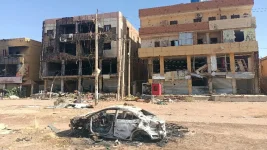The leader of Sudan's Rapid Support Forces admitted his group pulled back from Khartoum after the army took control of the capital city. Mohamed Hamdan Daglo said on Sunday that his fighters left but promised they would come back stronger. This statement contradicted what the RSF claimed just three days earlier when they said there would be no retreat or surrender, only a repositioning of forces. The army had already declared victory on Thursday, saying they had eliminated the last RSF fighters from the city after nearly two years of fighting.
The conflict has created what United Nations officials describe as the worst hunger crisis in the world. More than twelve million people have lost their homes, tens of thousands have died, and parts of Sudan face famine, according to UN assessments. Daglo made clear he sees no path to peace talks, stating that anyone who thinks negotiations are happening with the army is wrong. He emphasized that only armed conflict remains between the two sides.
Army chief Abdel Fattah al-Burhan also refused to back down during his Saturday speech. He promised neither forgiveness nor compromise with the RSF, saying victory would only happen when every rebel fighter had been removed from Sudan. Despite the army reclaiming the capital city, including the presidential palace and airport, the country remains split in two. The military controls eastern and northern areas, but the RSF still dominates the western Darfur region and holds territory in southern parts.
Pope Francis asked for prayers and called for new peace talks as he recovers from pneumonia. Early attempts at mediation by the United States and Saudi Arabia failed when multiple ceasefire agreements collapsed. US Secretary of State Marco Rubio said Thursday that Washington hopes to increase diplomatic efforts to end the war. He mentioned discussions with Kenyan President William Ruto and Ethiopian Prime Minister Abiy Ahmed about the situation.
The previous Secretary of State, Antony Blinken, tried extensively but failed to broker peace. The United States has placed sanctions on both warring parties, accusing the army of attacking civilians and charging that the RSF committed genocide in Darfur. After suffering defeats for a year and a half, the army began pushing through central Sudan toward Khartoum late last year. Experts blame the RSF losses on poor strategy, internal fighting, and dwindling supplies.
New violence continues across Sudan. Witnesses reported drone attacks on Thursday night on both the airport and the dam near Damazin in Blue Nile state. The army claimed it shot down these RSF drones. About 500 kilometers northwest in El-Obeid city, medical sources reported Sunday that an RSF strike killed a child and injured eight other people. This attack adds to several others reported since February, when the military broke an RSF siege of the North Kordofan state capital.
A January United Nations expert panel found credible accusations that the United Arab Emirates has provided military support to the RSF through neighboring Chad. The panel monitors arms embargoes in the Darfur region. Officials from Abu Dhabi have denied these allegations. The fighting continues to spread across different regions of Sudan, despite the army retaking control of the capital.
The conflict has created what United Nations officials describe as the worst hunger crisis in the world. More than twelve million people have lost their homes, tens of thousands have died, and parts of Sudan face famine, according to UN assessments. Daglo made clear he sees no path to peace talks, stating that anyone who thinks negotiations are happening with the army is wrong. He emphasized that only armed conflict remains between the two sides.
Army chief Abdel Fattah al-Burhan also refused to back down during his Saturday speech. He promised neither forgiveness nor compromise with the RSF, saying victory would only happen when every rebel fighter had been removed from Sudan. Despite the army reclaiming the capital city, including the presidential palace and airport, the country remains split in two. The military controls eastern and northern areas, but the RSF still dominates the western Darfur region and holds territory in southern parts.
Pope Francis asked for prayers and called for new peace talks as he recovers from pneumonia. Early attempts at mediation by the United States and Saudi Arabia failed when multiple ceasefire agreements collapsed. US Secretary of State Marco Rubio said Thursday that Washington hopes to increase diplomatic efforts to end the war. He mentioned discussions with Kenyan President William Ruto and Ethiopian Prime Minister Abiy Ahmed about the situation.
The previous Secretary of State, Antony Blinken, tried extensively but failed to broker peace. The United States has placed sanctions on both warring parties, accusing the army of attacking civilians and charging that the RSF committed genocide in Darfur. After suffering defeats for a year and a half, the army began pushing through central Sudan toward Khartoum late last year. Experts blame the RSF losses on poor strategy, internal fighting, and dwindling supplies.
New violence continues across Sudan. Witnesses reported drone attacks on Thursday night on both the airport and the dam near Damazin in Blue Nile state. The army claimed it shot down these RSF drones. About 500 kilometers northwest in El-Obeid city, medical sources reported Sunday that an RSF strike killed a child and injured eight other people. This attack adds to several others reported since February, when the military broke an RSF siege of the North Kordofan state capital.
A January United Nations expert panel found credible accusations that the United Arab Emirates has provided military support to the RSF through neighboring Chad. The panel monitors arms embargoes in the Darfur region. Officials from Abu Dhabi have denied these allegations. The fighting continues to spread across different regions of Sudan, despite the army retaking control of the capital.












